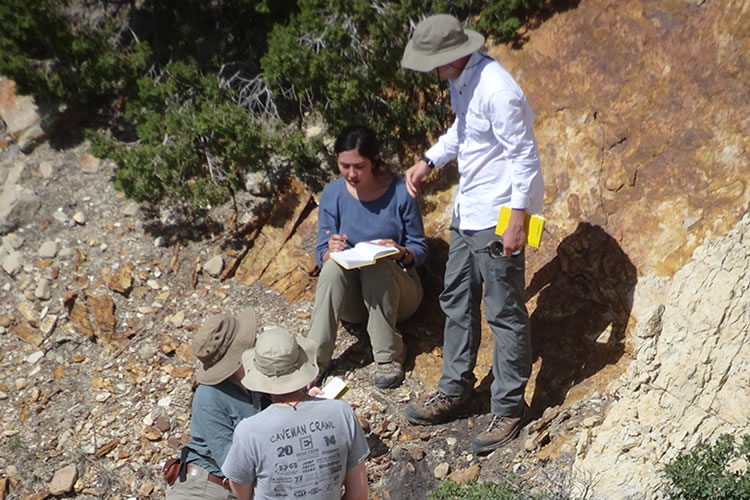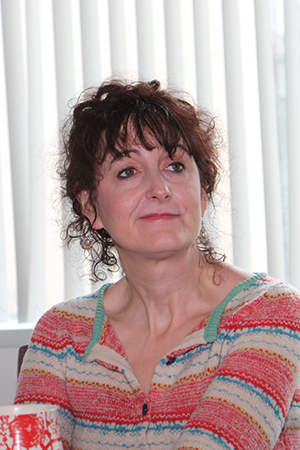
Undergraduate students in the School of Natural Sciences and Mathematics will continue their educational pursuits this summer while gaining valuable hands-on research experience.
The Department of Geosciences provides opportunities for field course work at geological sites in southern Colorado and northern New Mexico in two, 3-credit courses: Introductory Field Geology (GEOS 3300) and Advanced Field Geology (GEOS 4300). These courses, which are usually taken by students over two summers, begin in mid-May and run to late June.
“The field course work is an immersive experience where students do their own work out in the field identifying various types of rocks and formations and mapping Earth’s geological characteristics,” said Dr. John Geissman, head of the Department of Geosciences at UT Dallas. “Students make observations and get to figure things out.
“We camp onsite in tents and sleeping bags with nightly campfires and go into town about once a week mostly for hot showers,” said Geissman, who oversees the introductory field course. Dr. Mortaza Pirouz, an assistant professor of instruction in geosciences, leads the advanced field work course.
Not to be outdone, each year the Department of Physics offers its Summer Research Program in Experimental and Theoretical Physics, a National Science Foundation (NSF)-funded research experience for undergraduates (REU). The program at UT Dallas attracts undergraduates from universities across the country, while UT Dallas students often participate in REUs at other institutions.
“We offer activities toward career development, the Python workshop and talks on all areas of physics,” said Dr. Lindsay King, associate professor of physics and one of the principal investigators for the program at UT Dallas, “At UT Dallas we have accepted eight of eight spots for students from other universities to come here and participate in research.”

Last year, one of King’s students completed his REU at Louisiana State University (LSU) in Baton Rouge. And this summer, another of her students is going to Harvard University for their REU.
“I will participate in the Smithsonian Astrophysical Observatory’s Summer Intern Program (an NSF REU) at the Harvard-Smithsonian Center for Astrophysics. I will work with Dr. Andra Stroe to study the dichotomy in the radio black hole population,” said V. Catlett, a senior in mathematics at UT Dallas.
“Black holes at the centers of galaxies can spit out massive jets of material, and these jets inexplicably take one of two possible configurations. We’ll study some sources that appear to exhibit both configurations, one on either side, in the hopes of determining the mechanisms which cause this dichotomy,” they said.
At LSU, Evan Meade, a senior who is a dual major in physics and mathematics at UT Dallas, worked on computational astrophysics in the lab of Matthew Penny, an assistant professor of physics and astronomy.
Meade said his REU was a 10-week program that went virtual due to the pandemic.
“Last summer, I worked on expanding a program which simulates the imagery that will be generated by the Roman Space Telescope, set to launch around 2025. By manipulating existing astrophysical data, the code can create synthetic images which allow us to test how effective different designs would be at detecting exoplanets,” Meade said.
The overlap between physics and math research and curriculum is quite large, he said.
“If any students are interested, they’re relatively easy to do as a double major,” Meade said. “The most cutting-edge research now is dealing with computational models, so having computer science principles in one’s toolkit is really valuable.
“It worked out pretty well for me being virtual. You can do it from anywhere, all of us working on our laptops remotely. It can all be done online and on Zoom.”
NSF and UT Dallas have among their stated goals to increase the retention of underrepresented groups to provide much-needed role models for future students. The NSF program also aims to open up the pool of potential high-tech employees essential for the nation’s economic growth and prosperity.
Visit our Summer Research Programs page for other opportunities.
Help us leave the planet a better place for future generations. Your support for the School of Natural Sciences and Mathematics funds scientific discoveries with real-world applications, student and faculty recruitment, and academic scholarships.